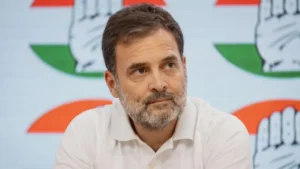NewsXpress-March-25,
A petition related to the citizenship of Congress MP Rahul Gandhi was heard in the Lucknow Bench of Allahabad High Court on Monday (24 March).
After which the High Court gave more time to the central government to present its reply in this matter.
According to news agency PTI, the Lucknow Bench of the court also ordered that the next hearing of this case will be listed in the week starting from 21 April.

The bench of Justice AR Masoodi and Justice AK Srivastava issued this order while hearing the PIL of BJP worker S Vignesh Shishir, a resident of Karnataka.
He has claimed that Rahul Gandhi also has British citizenship.
A short Intro of Rahul Gandhi;
Rahul Gandhi is a prominent Indian politician and a key figure in the Indian National Congress (INC), one of India’s oldest and most influential political parties. Born on June 19, 1970, in New Delhi, he hails from the Nehru-Gandhi family, a dynasty that has played a central role in shaping modern India’s political landscape. His grandmother, Indira Gandhi, and his great-grandfather, Jawaharlal Nehru, both served as Prime Ministers of India, while his father, Rajiv Gandhi, also held the office until his assassination in 1991. Sonia Gandhi, his mother, is a formidable figure in the Congress party, having held the position of president for nearly two decades. This lineage has placed Rahul Gandhi under intense scrutiny and high expectations from the moment he entered public life.
Rahul Gandhi’s early life was marked by tragedy and privilege. After losing his father at a young age, he and his sister, Priyanka, were raised largely out of the public eye by their mother. He pursued his education abroad, earning a Bachelor’s degree from Harvard University (though he transferred to Rollins College in Florida due to security concerns following his father’s death) and later an M.Phil. in Development Studies from Trinity College, Cambridge. Before entering politics, Rahul briefly worked in the private sector, including a stint at a management consulting firm in London. However, his family’s political legacy eventually drew him back to India.
He formally entered politics in 2004, contesting and winning the Lok Sabha seat from Amethi, a constituency long associated with the Gandhi family. His entry was seen as a move to rejuvenate the Congress party, which had been struggling to maintain its dominance in an increasingly competitive political arena dominated by the Bharatiya Janata Party (BJP). Rahul quickly rose through the ranks, becoming the party’s vice president in 2013 and later its president in 2017, a position he held until 2019. His leadership tenure was marked by efforts to appeal to younger voters and modernize the party, though it was also criticized for lacking strategic clarity.
Rahul Gandhi’s political career has been filled with both opportunities and obstacles. He has positioned himself as a vocal critic of the BJP and its leader, Prime Minister Narendra Modi, focusing on issues like unemployment, farmers’ rights, and social justice. Campaigns like the “Bharat Jodo Yatra” (Unite India March), a 4,000-kilometer walkathon he led in 2022-2023, showcased his attempt to connect with the masses and revitalize the Congress’s grassroots presence. However, he has also experienced setbacks in his leadership, most notably the Congress party’s poor performance in the general elections in 2014 and 2019, which led to his resignation as party president after the latter defeat. Despite his efforts, Rahul Gandhi remains a polarizing figure. Supporters view him as a principled leader committed to secularism and inclusivity, while critics, including political opponents, often portray him as inexperienced or out of touch, dubbing him “Pappu” in a derisive nickname. As of March 2025, he continues to play a significant role in Indian politics, navigating the complex dynamics of a changing nation while carrying the weight of his family’s storied legacy.
